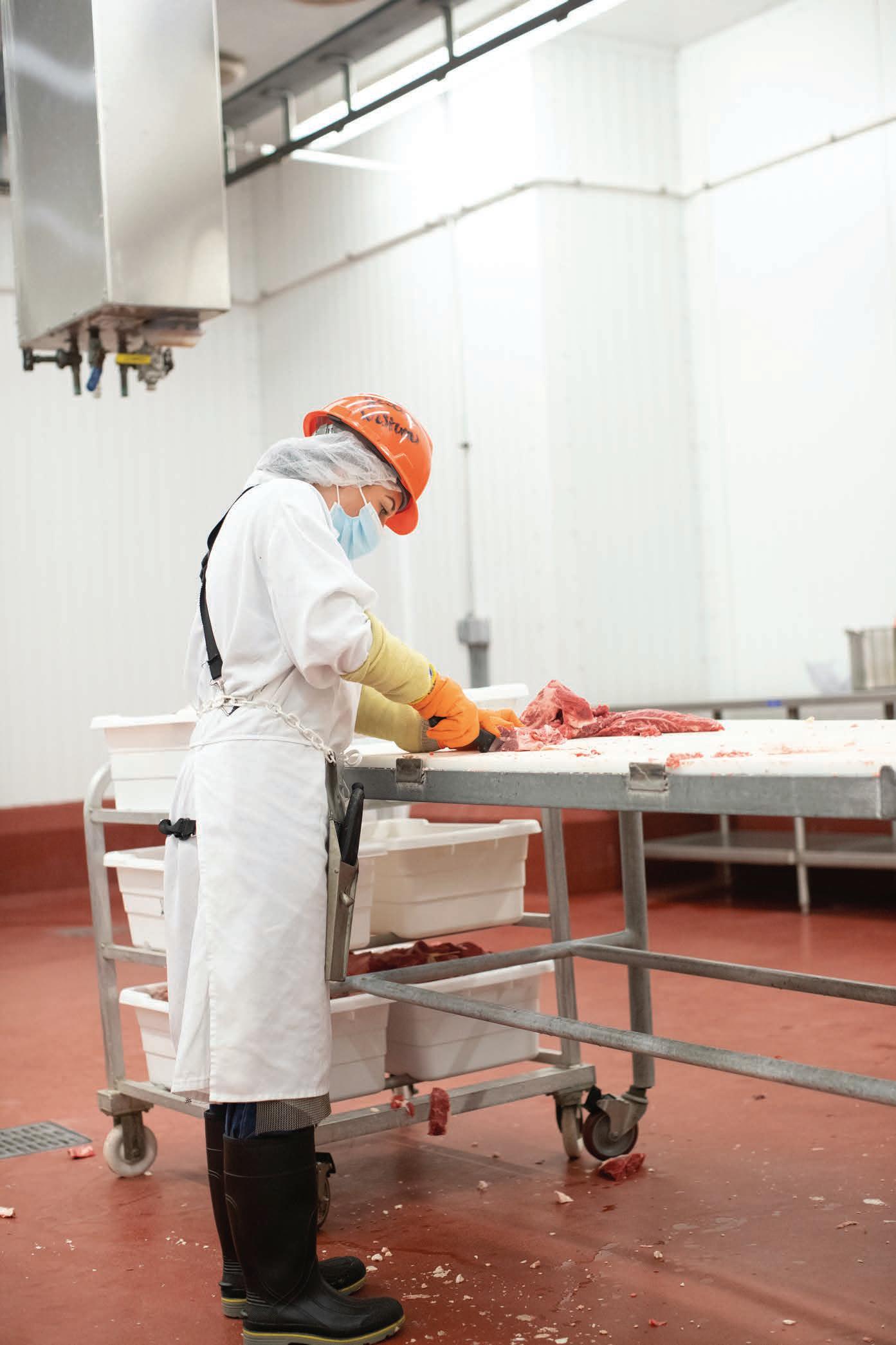
4 minute read
SMALL PROCESSING PLANT. POWERFUL IMPACT.
In the early stages of the COVID-19 pandemic, shoppers would go to their local grocery stores only to find the meat protein they wanted was out of stock.
To help add to the available supply, the Oklahoma State University Robert M. Kerr Food and Agricultural Products Center pilot plant continues to provide Oklahomans resources throughout the pandemic.
Advertisement
The FAPC pilot plant was created to help develop successful value-added enterprises in Oklahoma, said Chuck Willoughby, FAPC business and marketing relations manager.
The FAPC pilot plant has one fulltime staff member, Brandon Kahle, and multiple student workers. Since FAPC opened in 1997, U.S. Department of Agriculture inspections have allowed the sale of meat from teaching and research activities.
“About seven years ago, FAPC began processing more frequently for customers,” Willoughby said.
Willoughby said various factors caused the tremendous increase in the demand for locally processed meat, especially during the pandemic.
Consumers now want to know if their meat is raised and processed in the United States, Willoughby said.
The FAPC pilot plant’s traditional clients include small, locally branded beef companies and customers who sell at local farmers markets, said Kahle, FAPC meat pilot plant manager.
“At the beginning of the pandemic, the FAPC pilot plant was not processing custom orders for outside clients,” Kahle said. “We soon realized we needed to help alleviate the demands bigger processing plants had.”
Many processing facilities were booked into 2021, which prompted opening the FAPC pilot plant to help Oklahoma producers, Kahle said.
“In March, we decided the FAPC pilot plant needed to open up and do full processing,” Kahle said. “Since the first of May, we have processed nearly 200 head of cattle.”
In addition to beef, the FAPC pilot plant has processed pork. Oklahoma Pork Council officials contacted Kahle needing help processing 2-pound pork packages to be donated to the Regional Food Bank of Oklahoma, Kahle said.
“Every Friday for four weeks, we processed six to eight head of hogs at the FAPC pilot plant,” Kahle said. “To this point, we have ended up with approximately 2,600 pounds of pork.
“The pandemic impacted many sectors in this industry,” Kahle said. “We were more than happy to help the Oklahoma Pork Council with this important project.”
Producers in western Oklahoma donated the hogs to the council’s project, Willoughby said. They did not want their animals to be euthanized because processing plants were unable to meet the high demand, he said.
“This was a noble opportunity for the FAPC pilot plant to help the Oklahoma Pork Council,” Willoughby said. “Many individuals lost their jobs due to the pandemic and now need this added help from the food banks.”

JD Fox, a FAPC student employee, processes a piece of beef.
Photo by Kendall Harshman.
Jaelyn Sewell, OSU food science junior, was the only undergraduate student to help fabricate the pork for the Oklahoma Pork Council project. Her role in the project made her realize meat processors deserve more appreciation, she said.
"After seeing an increase of processors helping producers in Oklahoma," Sewell said, "I wish people would thank the processors for their work."
Sewell, who began working at the FAPC pilot plant in May, said she sees a continued need for smaller processing plants in Oklahoma and beyond.
“I truly believe more individuals are starting to realize how much processors do for our food system,” Sewell said. “We are often the middle man who is forgotten about, but our jobs during this time have been essential.”
During the pandemic, the demand for smaller processing plants has increased and many consumers are now picking them instead of larger plants, Sewell said.
“People may not think processing plants are important,” Sewell said, “but the processors are the reason individuals can get meat in stores and eat at home during the pandemic.”
A need has developed during the pandemic to have more processing plants open, Kahle said.
“The pilot plant has many resources to help producers in the state to open their own processing plants,” he said.
With the Coronavirus Aid, Relief and Economic Security Act passed by Oklahoma Gov. Kevin Stitt and Secretary of Agriculture Blayne Arthur, Kahle hopes to see more processing plants open or expand, he said. The CARES Act awarded grants totaling $10 million across 40 awards within the state of Oklahoma.
“This money will help with a variety of needs that newer processing plants or existing ones have,” Kahle said.
Rodney Holcomb, a FAPC agribusiness economist, was instrumental in developing the CARES Act, Kahle said.
Holcomb helped select the companies and individuals who received the grant funds.
“It has always been our mission to help new processing plants, and so we have,” Willoughby said. “We even have feasibility templates on the website for both small- and medium-sized processing plants.”
Before the pandemic started, having anyone interested in entering the meat-processing business was rare, Willoughby said.
Kahle said FAPC offers classes to help those interested in meat processing, including a Hazard Analysis Critical Control Points plan meant for processing plant owners.
“The course is designed to help individuals and companies know how to plan to be inspected on a state or federal level,” Kahle said. “This course helps individuals or companies move beef, pork or lamb into a retail sector.”
FAPC provides multiple resources and templates for anyone interested in learning more about starting and running processing plants.
“Even when everyone else started telecommuting, the processing plant never shut down,” Willoughby said.
Ideally, the FAPC pilot plant will go back to regular business of processing only for few clients and teaching, but for now it will be a resource for the state, Willoughby said.
“We are trying to take up a void in the private sector,” Willoughby said. “We also see the FAPC pilot plant not competing against the private sector. We are just helping it out.”
KENDALL HARSHMAN FREDERICK, MARYLAND









